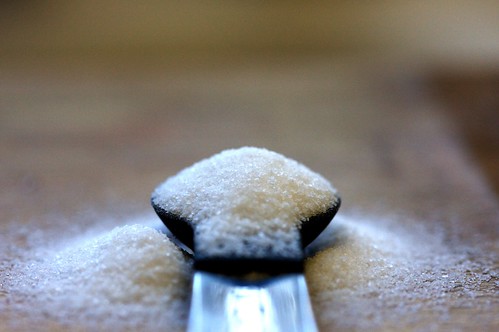
It’s possible that you’ve never even considered the question of salt, but salt in an essential component in baking. Sure, you may only add 1/2 a teaspoon at a time to your baked goods, but don’t take salt for granted! Salt accentuates the flavor of bakes goods. It particularly enhances the flavors of butter, and flour, and salt works wonders in a recipe with chocolate!
In bread baking, salt helps the gluten hold more water and carbon dioxide. Did you know that it also creates a stronger and tighter crumb.
There are three major types of salt in stores. How do you choose?
Jump on over, let’s talk salt!
Iodized Table Salt
Table salt is made by sending water down into inland salt mines and then evaporating that water until only salt crystals remain. In the 1920’s iodine was added to table salt in an effort to prevent goiters (yikes…) which were caused by an iodide deficiency. Most table salts sold in the United States are iodized.
Kosher Salt
Kosher salt is an additive free salt. It is racked during evaporation, which creates its characteristic flakes. Kosher salt comes in a course grain and a fine grain. The fine grain is great for baking, because it disperses quickly into ingredients. A course grain salt could have trouble evenly distributing through a baking recipe, and you wouldn’t want that.
Sea Salt
Sea salt is created from evaporated sea water. The process is a bit more costly than the inland mining process of table salt, and sea salt may contain trace amounts of minerals. Because there are many seas around the world, there are many varieties of sea salt: Celtic sea salt, Hawaiian sea salt, Fleur de Sel, and Sicilian sea salt, to mention just a few. Basically, if there’s a sea, there’s a good chance it has a salt. I use a fine grain sea salt- La Baleine from France. It’s nothing terribly fancy and can be found in most grocery stores in the states.
So which salt is best for baking? I know I’m supposed to have a definitive answer for you, but really… just use whatever salt makes you feel fine and dandy. The truth of the matter- in a blind chocolate chip cookie taste test, you may not be able to taste the difference between table salt, kosher salt and sea salt. It depends on how sensitive your palate is to salt. I happen to to think that iodized table salt has a stronger salt taste. I choose sea salt because it feels like it has a cleaner salt taste that accentuates other ingredients but isn’t an assault on the taste buds.
Do you have a favorite salt?


50 Responses
iodized salt is the best!!!!!!!!!!!!!!!!!!!!! always has been always will be!!!!!!!!!!!!!
I’m experimenting with baby foods at the moment. My little one really wants to be able to hold onto what she is eating with her hands, and I really need to be sure she is getting the nutrients she needs. What I’d like to experiment with is, is putting my purees and baby mash into something like a wanton wrapper. Under 12 months, it is advised that baby food is salt free. I’m unable to find a salt free recipe though. Wanton dough needs to be quite tight, so it needs something. Does anyone have any suggestions?
I read that yeast likes the mineral content of sea salt. It supposedly helps the yeast develop. I don’t know whether or not it is true, but I use sea salt in my home baked bread.
I admit it, I AM A SALTAHOLIC!!!!!! I LOVE salt on everything! I have just strated using sea salt and am already a fan. I have been using kosher salt for cooking and baking, but I am now going to use sea salt. Tomorrow I am making 3 pie crusts, so I may use iodized in one, kosher in one and sea salt in the last one. If I can distinquish any differences, I’ll let you know.
I just google what is the best salt for baking, and your blog was the first to pop up. Thank you for this post! I’ve been noticing all my baking recipes taste too salty even though I follow the recipes exactly. I use Kosher salt but I didn’t realize I should use a finer grain, maybe that is the issue. Is a fine grain kosher salt available in most stores? I’ve only seen one type of kosher salt for sale at most stores.
It depends on whether or not I’m dissolving the salt in the dough or finishing with salt. For dough, I like to use a fine ground sea salt. But I mostly use salt for finishing when I bake, and for that I actually find it works better when it’s a large crystal like a flake salt – not too hard to bite into but it doesn’t dissolve into nothingness. This is one of my favorite recipes to make – https://www.saltnews.com/2009/03/bali-rama-oatmeal-chocolate-chip-cookies/.
Started using iodized sea salt 6 months ago. For the first time in 30 years my husband’s blood pressure is now NORMAL. I just wish I could find a reasonably priced fine grained version.
It’s coarse not course. :)
Crazycat89,. I was wondering if anyone else would notice that response. Either John is confused or messing around with this post. You are in the right. Sugar and salt are different. They taste different, are used in different amounts and for different purposes etc. They are not one and the same.